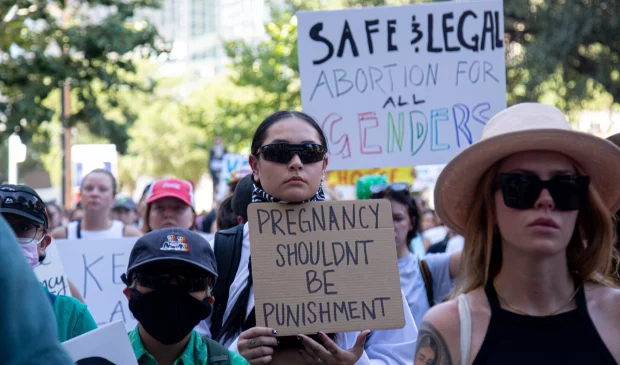Newsletter Signup
The Austin Monitor thanks its sponsors. Become one.
Most Popular Stories
- Council members celebrate unanimous defeat of bill that proposed putting Austin under state control
- A once-banned type of building is back in favor – and the Planning Commission approves
- Eviction crisis spreads as affordability pressures worsen
- East Austin’s ‘wishbone’ bridge takes shape as concrete beams almost span Lady Bird Lake
- Austin churches answer prayers for affordable housing – by building it themselves
-
Discover News By District

Photo by Patricia Lim/KUT
Travis County DA’s vow not to prosecute abortion crimes likely won’t make a difference, expert says
Friday, August 26, 2022 by Seema Mathur, KUT
Texas’ so-called trigger law went into effect Thursday. The law, which the Legislature passed in 2021, was designed to be ready should the U.S. Supreme Court overturn Roe v. Wade and make abortion no longer a constitutional right.
While the law makes it a crime to perform most abortions in the state, effectively banning the procedure, Travis County DA José Garza has said his office would not prosecute crimes under the law.
“Enforcing this law will not only fail to promote or protect public safety but will also lead to more harm,” he reiterated in a statement Thursday. “Our office will continue to fight for and protect women’s rights and use our discretion to avoid tragedy and preventable harm in our community.”
Other abortion laws already on the books in Texas include Senate Bill 8, known as the Heartbeat Act, which banned most abortions after about six weeks of pregnancy, and an old law with origins dating back to the late 1800s, also referred as the 1925 law, which prohibited abortion.
Elizabeth Sepper, a professor at UT Austin’s School of Law with an expertise in health law, spoke with KUT about what this all means.
This conversation has been edited lightly for clarity.
KUT: Can you remind us of the scope of the trigger law?
Elizabeth Sepper: Texas’ trigger ban is a near absolute ban on abortion. It sets criminal penalties for performing or participating in an abortion of five years (in prison) to life. It has very limited exceptions, and no exceptions for rape or incest. It does exempt most ectopic pregnancies, D&C (a procedure to remove tissue from inside the uterus) where there’s been fetal demise and those abortions are necessary to save someone’s life.
Who can be held liable and charged under this law?
The law is primarily targeted at those who participate in or provide abortions, so physicians, nurses, pharmacists or the like. There are criminal penalties that are very severe, up to life imprisonment. There are also civil penalties. The attorney general can seek $100,000 per abortion, and the licensing authorities are instructed that they must revoke a professional license for providing an abortion in violation of the trigger ban.
What about people seeking abortions?
People who are pregnant and receive abortion care or self-manage abortions can’t be prosecuted under the abortion-specific laws that we have.
Can other people be charged as an accomplice?
Yes, so for a substantive crime, say stealing a car, you have the car thief, but they also may have accomplices. So they would be charged not with the theft of the car, but with accomplice liability for the theft of the car. And the same sort of logic could apply (here).
Garza has said that his office won’t prosecute cases under the trigger law. What impact do you expect this to have?
District attorneys have the primary responsibility for enforcing criminal laws. They also have discretion in terms of which laws they prioritize for enforcement.
The district attorney’s promise not to prosecute, I think, provides some limited reassurance to people who might be self-managing abortion if they get and take the abortion medication in Travis County. But, say a prosecutor in Hays County takes the opposite stance and wants to prioritize prosecution. If they pick up the abortion pills in Hays County and return to Travis County, then the Hays County prosecutor might be able to bring criminal charges.
Physicians aren’t going to be reassured by a promise of not facing criminal prosecution if what they could face instead is a $100,000 fine and the loss of their medical license, which is worth far more than $100,000.
So the trigger law, House Bill 1280, doesn’t necessarily supersede previous abortion laws, right? They are all in effect?
Yes. So we do have abortion bans on top of abortion bans with different penalties, different scope and applications.
We have the pre-Roe law, it’s basically been the same way, I think since, well, even before the 1800s. We also have SB 4, which bans mailing medication abortion into the state of Texas. And we have also have SB 8 still in effect, which means anyone who performs or aids and abets an abortion could face a private civil action. It is the “bounty hunter law” that allows private individuals to receive $10,000 per abortion and they can sue anyone involved in the abortion, other than the pregnant person.
Abortions in Texas will largely become homicides, in addition to being targeted by the trigger law. People could be criminally prosecuted not only for directly violating the law, but also for conspiring to violate the law, possibly for solicitation, a violation of the law or for accomplice liability, that they’re accomplices to the crime of abortion.
In the case of high-risk pregnancies, where before HB 1280, and to a degree SB 8, they could be terminated, now many doctors won’t perform them; can they be sued for medical malpractice?
Usually when we talk about medical malpractice, we’re holding physicians to a national standard of care. What do doctors do when they’re faced with a patient with this particular condition? And for some conditions, the answer is going to be doctors offer to terminate the pregnancy and they perform a termination if the patient wants it.
Physicians in Texas won’t be able to do that anymore. But, I suspect what will happen in a medical malpractice case, if one were to be brought, is that the doctor would say, Well, the standard of care has changed in Texas. I have to comply with the state law, and the state law does not permit me to perform an abortion under these circumstances.
This story was produced as part of the Austin Monitor’s reporting partnership with KUT.
The Austin Monitor’s work is made possible by donations from the community. Though our reporting covers donors from time to time, we are careful to keep business and editorial efforts separate while maintaining transparency. A complete list of donors is available here, and our code of ethics is explained here.
You're a community leader
And we’re honored you look to us for serious, in-depth news. You know a strong community needs local and dedicated watchdog reporting. We’re here for you and that won’t change. Now will you take the powerful next step and support our nonprofit news organization?








